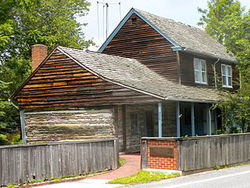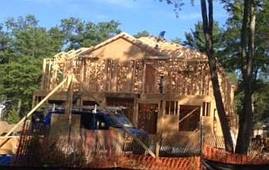|
* Home * History * Population * Government * Politics * Lobbyists * Taxes * State Symbols * Biographies * Economy * Employers * Real Estate * Education * Recreation * Restaurants * Hotels * Health * Environment * Stadiums/Teams * Theaters * Historic Villages * Historic homes * Battlefields/Military * Lighthouses * Art Museums * History Museums * Wildlife * Climate * Zoos/Aquariums * Beaches * National Parks * State Parks * Amusement Parks * Waterparks * Swimming holes * Arboretums More... * Gallery of images and videos * Fast Facts on key topics * Timeline of dates and events * Anthology of quotes, comments and jokes * Links to other resources |
-- Real Estate - Overview
 Built between 1638 and 1641 by Finnish settlers in colony of New Sweden, log home claimed to be oldest existing log building in US and oldest standing wooden structure in the Western hemisphere located in what is now Gibbstown section of Greenwich Township in Gloucester County. Image: Wikimedia Commons Built between 1638 and 1641 by Finnish settlers in colony of New Sweden, log home claimed to be oldest existing log building in US and oldest standing wooden structure in the Western hemisphere located in what is now Gibbstown section of Greenwich Township in Gloucester County. Image: Wikimedia Commons
-- Historical overview
Since its first settlement by Europeans, real estate has been at the center of New Jersey's economic and political evolution. Both the Dutch and the English used land grants as incentives to attract settlers to their colonies, and for many years as a Royal colony disputes over land titles provoked conflict--and occasional violence--dividing those within its towns and villages and sparking opposition to its rule by agents appointed from abroad. In the first half of nineteenth century, the state's strategic location between New York City and Philadelphia fueled its growth, leading to the development of industry and housing along the corridor connecting the fast-growing cities. Following the Civil War, New Jersey's position at the gateway for European immigration sparked further expansion and development into the next century. With the introduction of the automobile, communities outside the older cities began to emerge as what would become the pattern of New Jersey suburbanization, later spurring the surge in housing for the new families formed after the end of World War II. More recently, the impact of a densely-populated state and concerns for protecting environmental resources, have produced sharp debates on the use of increasingly limited available land and the consequences of its high costs of development and taxation. --Value and total construction
The New Jersey Association of Realtors reported that as of August 2022 the average sale price in the state during 2022 for a single family home was $596,425; for a townhouse/condo $433,988; and for an adult community unit $335,442. The average time from listing to sale for a single-family home was 35 days, and sale prices were 101.7% of the price listed for sale. As of August 2022, the national real estate site Zillow.com reported that the typical home value of homes in New Jersey was $471,472--a value seasonally adjusted and only including the middle price tier of homes. The median rent price in New Jersey was $2,424 / per month. As of 2021, New Jersey had a total aggregate value of real property exceeding $1.134 trillion, according to annual data published by the New Jersey Division of Taxation. Over the past decade, the inventory of homes for sale in New Jersey has been shrinking. In July 2011, there were 71,194 unsold homes on the market in the state, but in July 2021, there were only 20,729 homes listed for sale. Building permits in New Jersey peaked at nearly 40,000 units in 2005, before experiencing a steady decline over the following years. In 2022, there were 15,789 housing units issued by permits for the year through June. * Monthly Housing Report, New Jersey Association of Realtors
* Table of Equalized Valuations by County 1998-2020, New Jersey Division of Taxation -- Office leasing and construction After the downturn of the 2008 recession, office leasing in the state has recovered to reach a statewide vacancy rate of approximately 15% before the 2020 COVID-19 lockdowns. The strongest markets were near New York City, with demand highest for offices for legal, computer and financial services tenants. * Building Permits: Yearly Summary Data, New Jersey Department of Community Affairs * New Jersey Home Prices & Values, Zillow * Monthly Indicators, New Jersey Association of Realtors -- Mortgages Mortgage rates in New Jersey are available from individual lending institutions, along with averages posted online by national web sites such as LendingTree.com, BankRate.com and Zillow.com. New Jersey mortgage rates, according to BankRate.com, averaged as of October 2022 around 6% for a 30-year fixed loan. Rates had increased sharply in the first half of 2022 as a result of increases in the prime rate by the Federal Reserve after being at extremely low historical levels for the years following the 2007 fiscal crisis. * New Jersey Mortgage Lenders-Reviews and Ratings, BankRate.com * Best Mortgage Lenders Money.com |
Let's discuss your real estate needs at the Jersey Shore in Monmouth County!
I'm Mary Comfort at PatrickParkerRealty.com, your one-stop source for real estate. Email Me |
|
- Rental market
New Jersey ranked as the seventh most expensive location for U.S. renters in 2022, according to report published by the nonprofit Housing and Community Development Network of New Jersey. Only Hawaii, California, New York, Massachusetts, Washington and the District of Columbia are more expensive. Statewide, rentals of two-bedroom apartments averaged $1,972 a month. Hudson County is the most expensive area in the state to rent. Hunterdon, Middlesex and Somerset are also among the most expensive counties, with an average monthly rent of $1,851 for a two-bedroom apartment, according to the study. In order to afford that level of rent plus utilities — without paying more than 30% of income on housing — a New Jersey household must earn $5,428 monthly or $65,137 annually, the report said. New Jersey had slightly under 1.1 million renters in 2021, making up nearly 36% of New Jersey households according to a study by the National Low Income Housing Coalition. As of April 2022, according to the website rent.com, rental for an average one-bedroom apartment in the state was $2,396 per month--an increase by nearly 33% since April 2021. In Jersey City, the average increase was some 50% to an average of $3,943 monthly, the nation's biggest jump in rental prices between 2021 and 2022, an increase topped only by New York City. Median monthly gross rent as a fraction of median household income was 20% in the state, according to the Census Bureau. * Out of Reach 2021, National Low Income Housing Coalition * New Jersey Home Prices & Values, Zillow * Rent Prices Increased By More Than $1,000 in the Past Year in These Major Cities, 5/24/2022, Rent.com * Fact Sheet: Out of Reach New Jersey 2022, Housing and Community Development Network of New Jersey * N.J. has the 7th highest rents in the nation, report says. Here’s what a typical apartment costs, 7/28/2022, NJ.com (subscription) -- Foreclosure When a homeowner fails to make a mortgage payment, the mortgage is delinquent and the lender may initiate the steps in the foreclosure process. A foreclosing party must send a notice of intention to foreclose, by registered or certified mail, to the borrower 30 days before filing a foreclosure lawsuit. Unlike several other states, New Jersey mandates that foreclosures go through the state court system, which substantially increases the time and costs of the process. The federal housing arm Freddie Mac has estimated the time in New Jersey for completing the foreclosure process from filing the notice to sale of the property at 450 to 600 days, tied with Florida as the lengthiest in the nation. With a foreclosure rate of one in every 4,868 homes as of August 2021, New Jersey had the third highest rate among the states, behind only Illinois and Nevada..Of the state's 3,616,614 housing units, 743 went into foreclosure in August. The counties with the most foreclosures per housing unit were (from highest to lowest): Salem, Gloucester, Atlantic, Monmouth, and Cumberland. Foreclosure actions are filed in the clerk's office of foreclosure of the Superior Court, Chancery Division, General Equity Part in Trenton. New Jersey has a statutory right of redemption, which allows a party whose property has been foreclosed to reclaim that property by making payment in full of the sum of the unpaid loan plus cost within ten days after the foreclosure sale. * Foreclosure Rates for All 50 States, Sofi.com * Top Foreclosure States, Bankrate.com * Foreclosure Trends, RealtyTrac.com * Summary of New Jersey Foreclosure Laws, Nolo.com |
|
|
-- Residential Developers
New Jersey's residential housing market features a diverse variety of builders, from national firms to individual builders constructing single family homes. The state's largest homebuilder is Hovnanian Enterprises (which markets homes and residential communities under brand K. Hovnanian® Homes) founded in 1959 by the late Kevork Hovnanian, which also has operations in 15 other states, including New York, Florida, Arizona, Texas, and California. Toll Brothers, the nation's largest luxury homebuilder based in Pennsylvania with homes in 24 states, is also active in New Jersey, specializing in upscale single-family homes and multi-family condominium projects. Lennar, one of the nation's largest builders, has several multi-family and active adult communities in New Jersey. * New Jersey Builders Association
* Monthly Housing Market Statistics, New Jersey Association of Realtors * Guide to Affordable Housing, New Jersey Department of Community Affairs
|
|
|

